Weekend in Whistler – Cornucopia 2010
Posted by Brenda Lowe on Monday, November 22nd, 2010Tags for this Article: cornucopia, festival, Whistler, Wine
Sometimes you live in a city for a long time but don’t get out to things that you would otherwise if it wasn’t so close by and thus more easily taken for granted. For me, Whistler Cornucopia is one of those things. Even though I’ve lived here for almost as long as Cornucopia’s been running, this was my first year attending it. Since I don’t ski or snowboard, there isn’t much cause to get out there very often. In terms of physical distance, Seattle is almost twice as far away yet I’ve been there more often and it feels less remote.
Due to happenstance circumstances, I was able to attend this year’s Cornucopia as the Foodists representative. The media pass allowed me to go to a wider range of events than I might normally have chosen as a regular attendee, so it was a fantastic first experience.
Day 1 – Thursday November 11
House Party – Best of BC
Things kicked off on Thursday evening with a party that showcased a selection of BC beer, wine and spirits, with a gourmet BBQ feast by Four Season’s Sidecut restaurant. It was a great start to the weekend and just what I needed after the drive up from Vancouver.
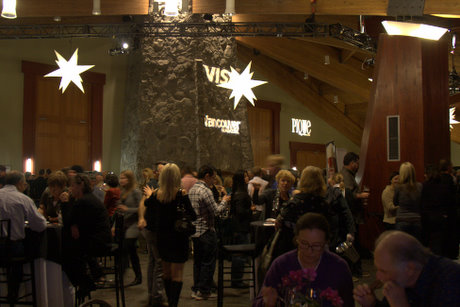
House Party
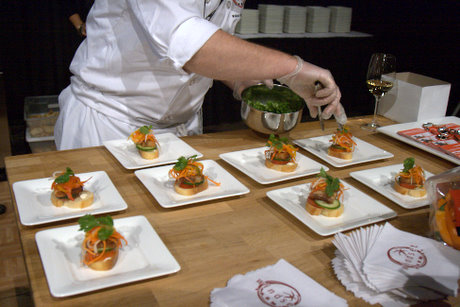
Pork belly canapes by Windset Farms
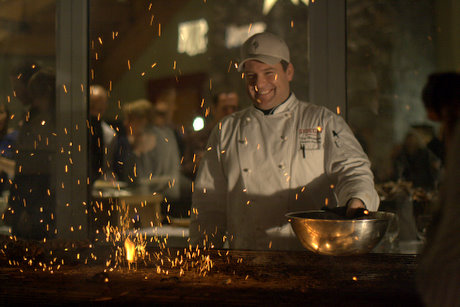
Executive Sous Chef of Sidecut Restaurant
Day 2 – Friday November 12
Whistler’s Chef Challenge
If you’ve ever wondered what it would be like to attend an Iron Chef competition, this is the event for you. Better yet, the admission is free. The Whistler’s Chef Challenge pitted three chefs from Bearfoot Bistro against three chefs from Sidecut restaurant in a timed, one hour cooking competition with a mystery secret ingredient. The chefs knew ahead of time that the ingredient was going to be either carrots, sea urchin or venison. Once the ingredient was selected (which turned out to be venison), the teams have 5 minutes to brainstorm. In addition to bragging rights, there was a $2000 cash prize at stake.
Windset Farms supplied produce for the competition and also put up $500 for the team that made the best use of their products. Headquartered in the Fraser Valley, Windset grows tomatoes, peppers, cucumbers, eggplants and endives on farms in BC, California and Las Vegas.
Along with Windset produce and a basic pantry, the teams were allowed to bring in their own ingredients. Some of the more intriguing items were foie gras, truffles, squid ink and liquid nitrogen.
Each team prepared five dishes, with the first dish served at the 60 minute mark and subsequent dishes served every 10 minutes thereafter. It was fascinating to watch the amount of cooking and different preparations that professionally trained chefs could execute under pressure, and the speed at which everything was done: making stocks and purees from scratch, clarifying consomme, making fresh ravioli, using sous vide techniques. Not to mention the incredibly delicious smells being generated from so many dishes being made at the same time.
The serving of the dishes coincided with the beginning of the Trade Tasting event so I missed the second half of the competition. The Bearfoot Bistro team emerged victorious.
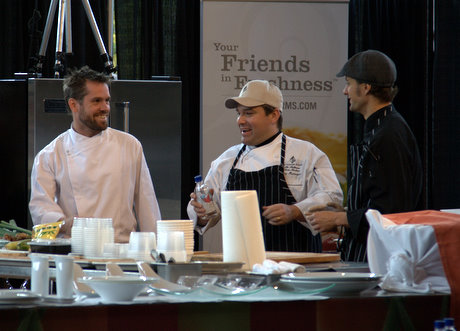
Team leaders from Bearfoot Bistro and Sidecut Restaurant
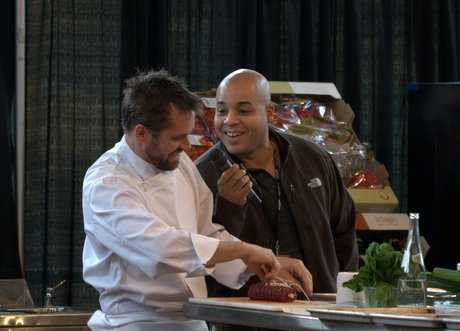
Bearfoot Bistro team being interviewed during the competition
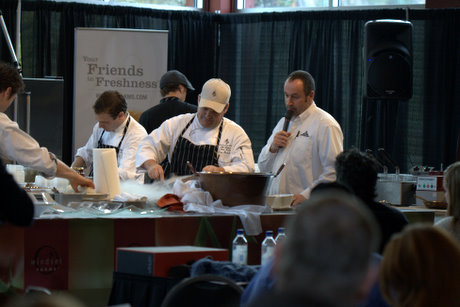
Sidecut Restaurant using liquid nitrogen
Trade Tasting
The Trade Tasting is only open to industry and media, and is a chance for people to speak with wine representatives about the wines featured at Cornucopia. (These are the same ones that are available at the public CRUSH Grand Gala Tasting.) Personally I found this to be one of the most educational events of the weekend.
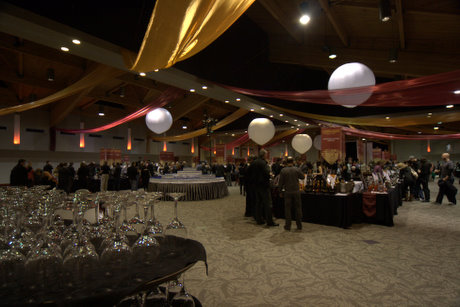
Trade Tasting floor
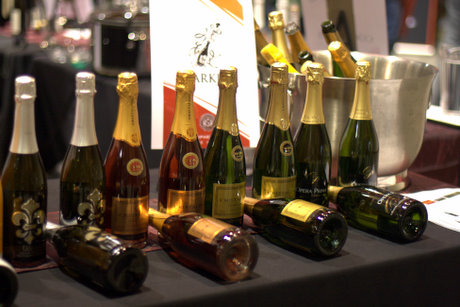
Christopher Stewart - Sparkles table
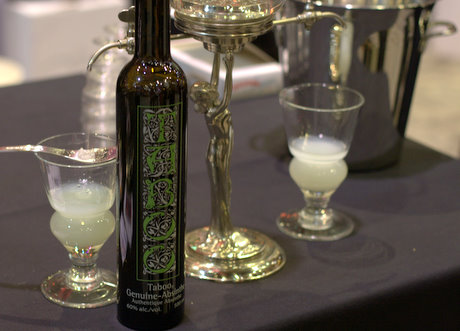
Taboo absinthe from Okanagan Spirits

XFour vodka
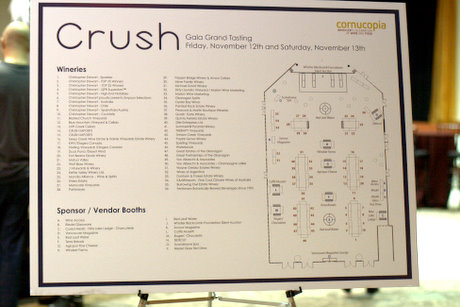
Trade Tasting & CRUSH floor plan
Aura Restaurant
I wasn’t attending any of the evening’s events and after a full afternoon of wine tasting, I was in the mood for a casual and quiet dinner. I really enjoyed the house made charcuterie from the Nita Lake Lodge table at the Trade Tasting so I decided to have dinner at the lodge’s Aura restaurant.
Diners choose either the 5 course tasting menu or by selecting dishes from a three course prix fixe menu. I went with the latter option and chose the foie gras parfait appetizer (for an supplemental charge), the pork entree (three different cuts of pork, each cooked a different way), and the chocolate dessert. The dishes were very creative, well executed, beautifully plated, refined and delicious. There were a few things that could have used some tweaking, but overall the meal was great value and I would go back to try the longer tasting menu.
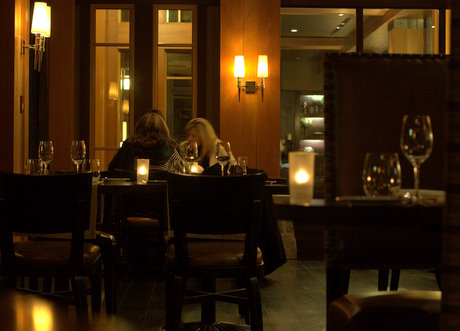
Aura Restaurant
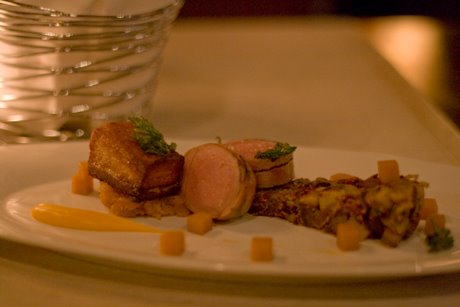
Pork Three Ways
Day 3 – Saturday November 13
Chef’s Table Luncheon – Wayne Martin of Crave Restaurant & Road 13 Winery
Set in a large luxury Whistler home, chef Wayne Martin of Crave Restaurant and his staff prepared a four course gourmet luncheon paired with Road 13 wines. Guests were free to mingle around the rooms attached to the open kitchen, and talk to the chefs and Road 13 winery owners throughout the meal. Chef and winemakers luncheons are a really fun way to learn more about the food and wine industry. The people involved are very passionate and willing to share their knowledge, and they love it when guests express an interest in what they do.
The luncheon spanned three hours but the time flew by very quickly. There was plenty of food and wine, great conversations, and happy guests. Everyone involved in this event was so hospitable, and it ended up being my favourite festival experience.
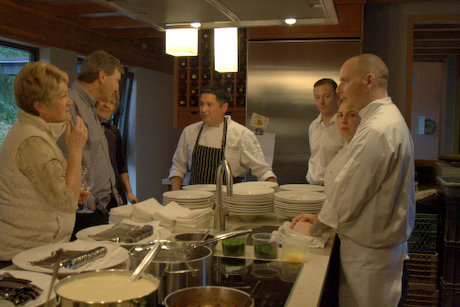
Wayne Martin, staff & guests
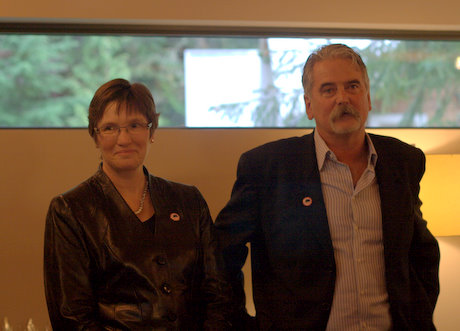
Pam and Mick Luckhurst of Road 13 Winery
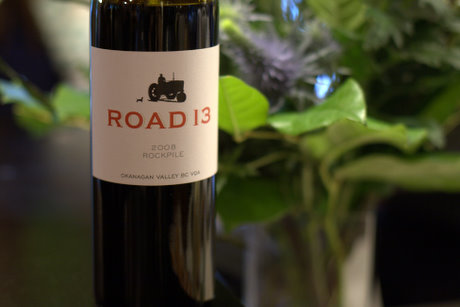
Rockpile, blended red wine
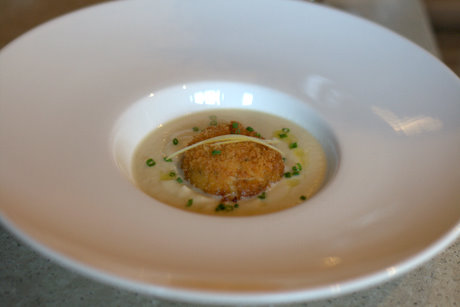
Dungeness crab cake & roasted cauliflower veloute - paired w/ Road 13 Riesling
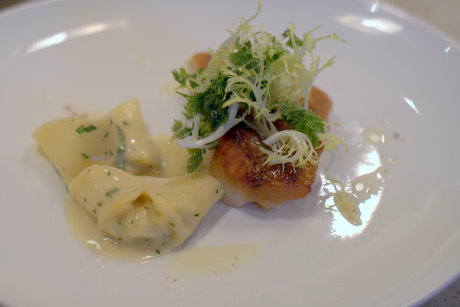
Seared striped bass, pumpkin tortellini in butter & basil sauce - paired w/ Road 13 Chardonnay
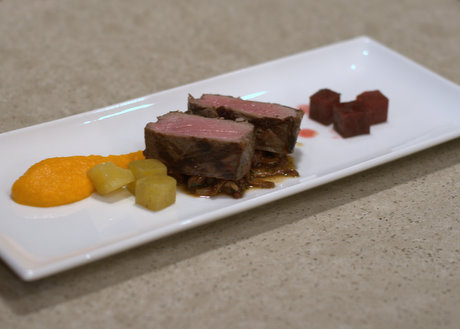
Dry aged New York steak, chanterelle & boar bacon ragout, beets & carrots, red wine jus - paired w/ Road 13 Pinot
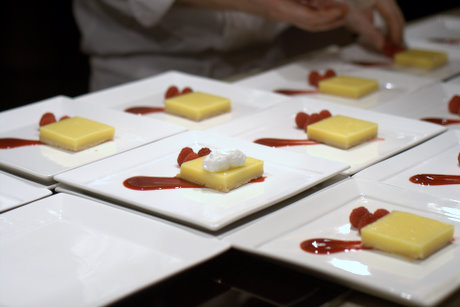
Lemon tart with meringue, raspberry compote, raspberries
Rye Cocktails
I was very satiated from the luncheon and thankfully there was a short break between arriving back at the hotel and the next event.
The rye cocktails seminar was hosted by Shaun Layton, the head barman of L’Abbatoir restaurant in Vancouver. My knowledge of spirits is quite minimal and I usually prefer them in mixed drinks rather than straight up, so this was a very educational session for me.
Shaun started us off with an “Old Pal” cocktail, which tastes similar to a Negroni. Made with rye whisky, Campari and dry vermouth, it was slightly bitter but smooth and nicely refreshing. He then went over the major differences between rye whisky in Canada and the United States, before leading the audience in a tasting of five different bottles. The rules governing rye up here are much looser than those south of the border.
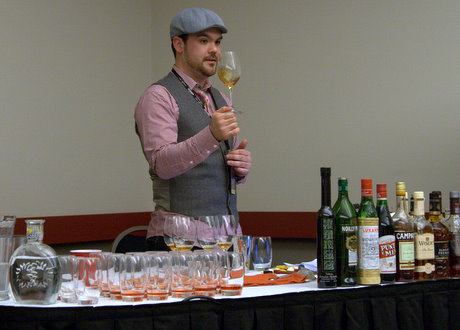
Shaun Layton of L'Abbatoir Restaurant
In Canada, the finished product must taste or have an aroma resembling rye even though there it could have been made with as little as 10% rye content. It must be aged for a minimum of 3 years in wooden barrels no larger than 50 liters. There are no laws around barreling or char time. Canadian rye is thought of as an entry level whisky due to its more mellow and sweet nature.
In the United States, rye must be aged for at least 5 years, made with a minimum of 51% rye, aged in brand new and charred Americal barrels, and the char times are very specific. Once bottled, the rye must not be more than 125 proof (62.5% alcohol by volume).
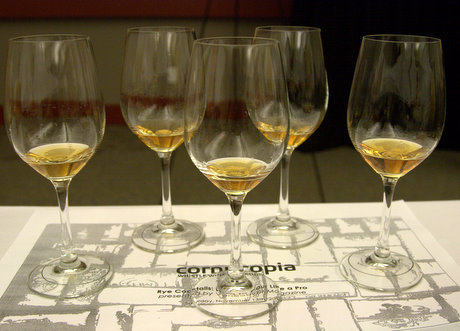
Whisky tasting
The five spirits that we tasted were:
- Wiser’s Deluxe Canadian Whisky
40% alcohol, aged 10 years. Sweet caramel aromas, butterscotch or toffee, vanilla. Smooth and light on the palate, light wood, nice “bridge” for non-whisky drinkers. - Alberta Premium
100% made from rye, 40% alcohol. Less sweet on the nose than Wiser’s Deluxe. More “masculine” and darker caramel aromas. More flavourful than Wiser’s Deluxe. - Wiser’s Small Batch Canadian Whisky
Higher in alcohol (43.4%). Butterscotch, toffee, creme brulee (burnt sugar) notes. Spicey on the palate. - Buffalo Trace Kentucky Straight Bourbon
Sweet, toasted marshmallow notes. Spicey finish, strongest so far of the four tasted whiskys. - Knob Creek Bourbon
15% rye content. Good mixing bourbon, aged for 9 years. Light on the front palate, very spicy and strong on the finish.
Shaun then made three different cocktails to illustrate the use of whisky in mixed drinks. A rye’s characteristics will impact the aroma, flavour and smoothness of the drink. (Some good reference books are Craft of the Cocktail, and Forgotten Spirits.)
- Cocktail #1 – Algonquin
2oz whisky, 1oz chilled vermouth, 1oz pineapple juice. Shake all of the ingredients together with crushed ice, then strain. Be careful of over-shaking, which can water down the drink. Made with Canadian whisky; its natural sweetness enhanced that of the pineapple juice. This was very easy to drink, with almost no taste or sense of alcohol. - Cocktail #2 – Red Hook
2 oz whisky, ½ oz Punt e Mes (sweet Italian vermouth), ¼ – ½ oz Luxardo Maraschino liqueur. Stir all of the ingredients together. Made with Buffalo Trace. I rarely ever have all-spirit drinks and I was surprised at how much I liked this one. It was smooth and sweet, with aromas of butterscotch and caramel. This drink is usually garnished with a maraschino cherry. You can make your own by steeping cherries in brandy. Leave the pits in for a slight bitter flavour to balance out the sweetness. - Cocktail #3 – Sazerac
1 sugar cube well-mashed with lemon, a few dashes Peychaud’s bitters (no substitutions!), 2 oz rye. Stir and strain into a glass that has been misted with absinthe.Made with Canadian whisky. Very nice aroma, of citrus, sweetness, herbs and licorice.
CRUSH Grand Gala Tasting
This is Cornucopia’s flagship event, and it was the first time that it has been held on two nights: Friday and Saturday. With over 75 exhibitors, hundreds of attendees and hundreds of wines to try, it’s best to go in with a game plan. The CRUSH brochure is available at the registration/ticket/info area and contains a full listing of all wineries, wines, retail prices and a floor plan. There are also a few food tables scattered throughout, providing very tasty savoury and sweet nibbles.
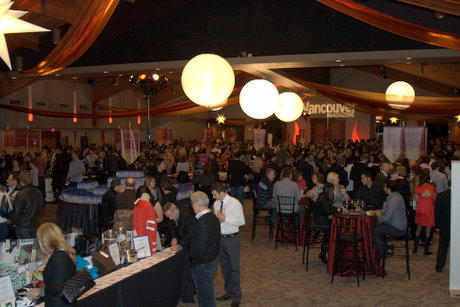
CRUSH Gala Grand Tasting floor
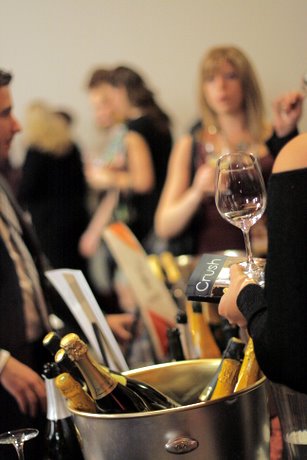
At the Christopher Stewart table
Day 3 – Sunday November 14
Sushi, Sake and Wine with Kame and Sushi Village
Sushi chef Kame from Sushi Village has an astonishing 45 years of experience and comes from a family of sushi chefs in Tokyo. The quality of the dishes that he prepared was top notch; from the beef tenderloin tataki, the mini-selection of tuna and salmon nigiri, and my favourite, the Beautiful Roll which lived up to its name in looks as well as taste.
While Chef Kame and his assistant prepared the food, Richard Li from Select Wines gave an overview of the sake making process. Beyond the characteristics of the rice or water from which sake is made, a key difference is also the degree to which the rice grains are milled before fermentation. This was most evident by comparing samples of Gekkeikan Draft with Horin Junmai; rice is milled to 70% of its original size in the first sake and to 50% in the second. The Junmai was much smoother on the palate, almost silky.
We also learned that sushi can pair very successfully with wine. Crisp, dry, aromatic whites such as Sauvignon Blancs do not overwhelm the delicate taste of rice and fish, and can enhance the natural sweetness present.
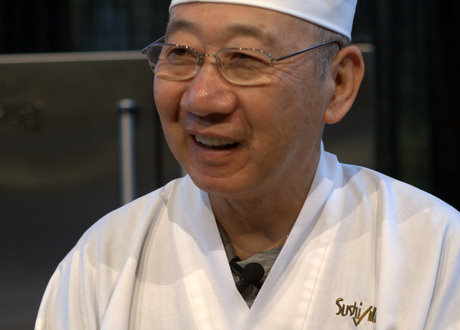
Sushi Chef Kame of Sushi Village
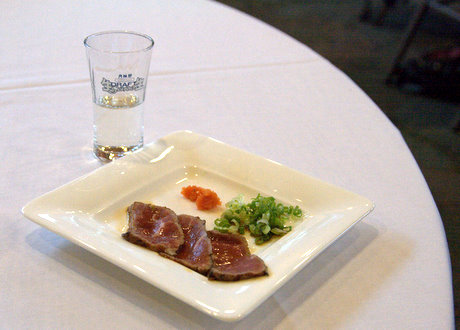
Beef Tenderloin Tataki with ponzu sauce, hot radish, green onion - paired w/ Gekkeikan Sake
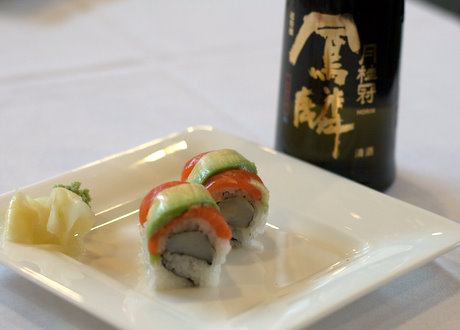
Beautiful Roll with scallops, salmon & avocado - paired w/ Horin Ultra Premium Junmai Daiginjo Sake
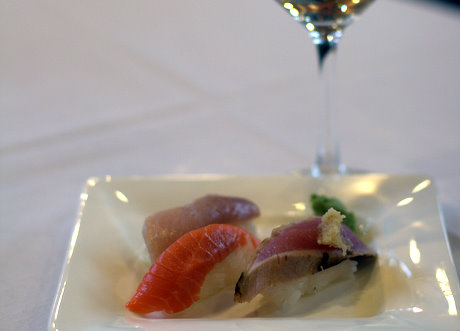
Albacore tuna, Sockeye salmon, seared Hawaiin tuna - paired w/ Casillero del Diablo 2010 Sauvignon Blanc
Mini Tasting – Common Ground: Seven Hills Vineyard Merlot
Even though Washington is the closest major wine region to us outside of BC, I knew very little about it. Its wines are not that well known here, and there isn’t a large selection at the BC liquor stores (just over 20, compared to the 300 from California). A lesser known wine region and an underdog varietal (thanks a lot Sideways) spoke to the wine geek in me so I chose to end my Cornucopia weekend at the Seven Hills mini tasting.
In addition to being known for onions, Walla Walla is also a grape growing region. Located in the southeastern corner of Washington, the area is known for producing structured, high quality Merlots. The northern Pacific latitude means long hot days and cool nights, resulting in higher acidity wines to balance the ripe fruit flavours. The grapes can be picked later in the year with less risk of over-ripeness. The characteristics are so strong that they are sometimes mistaken for Cabernet Sauvignons.
Seven Hills currently largest vineyard in Walla Walla. It sits on basalt soil, which is essentially 30 million year old lava. We tasted five wines from the Seven Hills vineyard, either pure Merlots or blends that included it. Interestingly, they tasted more like Old World wines. All of them had aromas of dark berry and currants. On the palate they had fine soft tannins, seemed lower in alcohol than many New World Wines. They were very easy to drink young but all will improve with a few years of age.
- 2008 Seven Hills Winery Merlot, Columbia Valley AVA, WA $22 US 14.2% abv
- 2008 Seven Hills Winery “Seven Hills Vineyard” Merlot, Walla Walla Valley AVA, WA $28 US 14.2% abv
- 2007 L’Ecole No. 41 “Seven Hills Vineyard” Merlot, Walla Walla Valley AVA, WA $36 US 14.5% abv
- 2007 L’Ecole No. 41 “Apogee – Pepper Bridge Vineyard” Red Wine, Walla Walla Valley AVA, WA $50 US 14.5% abv
- 2007 L’Ecole No. 41 “Perigee – Seven Hills Vineyard” Red Wine, Walla Walla Valley AVA, WA $50 US 14.5% abv
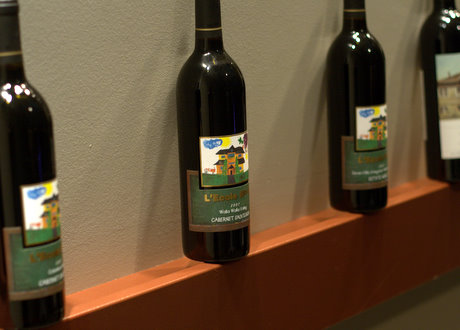
Seven Hills Vineyard L'Ecole Merlot
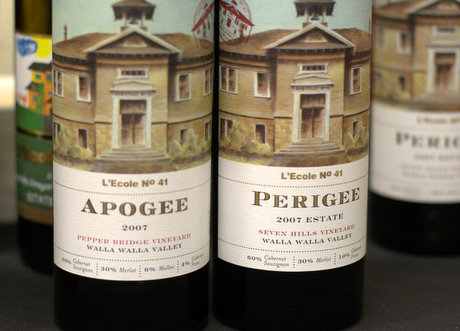
L'Ecole Apogee & Perigee
Final Thoughts
I had a lot of fun at the festival and it was wonderful to be in the company of so many food and wine enthusiasts. Many were from Whistler and the lower mainland, but I also met people from across the United States. The organizers and volunteers did a great job, and I look forward to seeing next year’s schedule of events.
Links
Sidecut Restaurant at the Four Seasons Whistler
Bearfoot Bistro, Whistler
Aura Restaurant at the Nita Lake Lodge, Whistler
Crave Restaurant, Vancouver
Road 13 Winery, Oliver
L’Abbatoir Restaurant, Vancouver
Sushi Village, Whistler
Seven Hills Vineyard, Washington Wine Commission
—
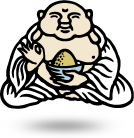

Posted on November 27th, 2010
Matt @ Whistler Real Estate says:
What a riot these few days were! I still cannot get the taste of the Lemon tart with meringue out of my mind…if I could only bake. I really enjoyed myself at the Whiskey tasting as well and came away with a few good shopping items I need to pickup. I cannot wait for the next event here!